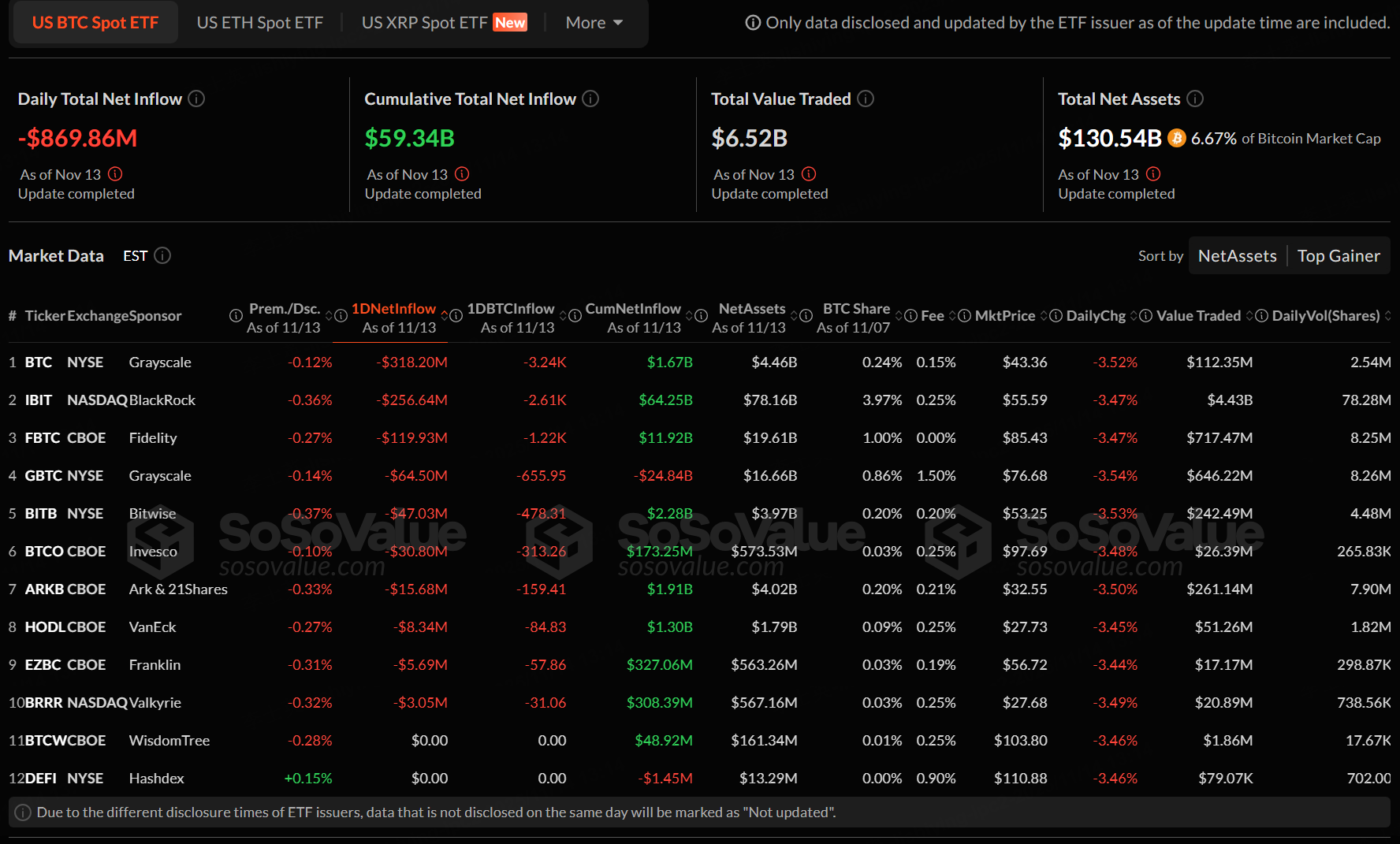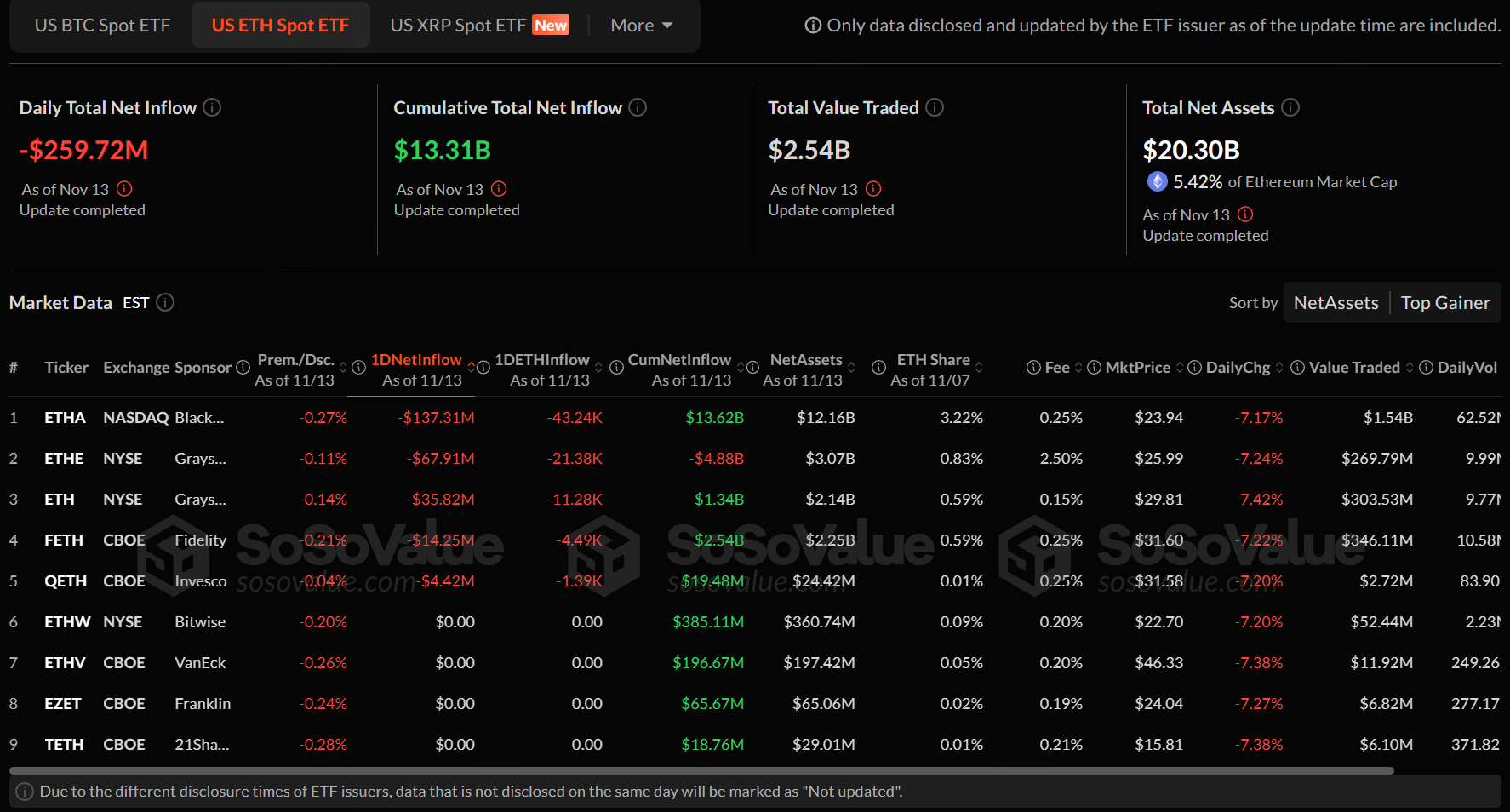Crypto Daily | Bitcoin Plunges to 6-Month Low Under $100K; Coinbase, Robinhood, and Bitcoin Mining Stocks Take Big Hits

Crypto News
Bitcoin Plunges to 6-Month Low Under $100K as Liquidations Pile Up
Bitcoin's price dropped below $100,000 for the third time this month as investors sold off risk assets like cryptocurrencies and tech stocks, with broader worries about the economy weighing on markets.
The price of the biggest digital coin was recently at $97,555, after a more than 2% fall over the past 24 hours. Bitcoin plunged below the mythical $100,000 mark on November 4 for the first time since May, and then dipped below the mark again on November 7 after a rebound.
Daily liquidations of crypto positions recently sat at $501 million, per data from CoinGlass, with Bitcoin adding about $165 million to the tally. Long positions, or bets that an asset's price would rise, account for about $380 million of the total liquidations.
Coinbase, Robinhood, and Bitcoin Mining Stocks Take Big Hits
Bitcoin miners and other crypto-focused stocks plummeted on Thursday amid a wider downturn in crypto markets and other risk-on assets, fueled by the same macroeconomic uncertainties that have bedeviled markets for weeks.
Miners Bitdeer Technologies Group and Bitfarms were down more than 20% and 18%, respectively, while Cipher Mining fell 14%. Share prices of other leaders in the sector, which has faced headwinds in recent weeks, were well into negative territory, including MARA Holdings, which holds the most Bitcoin among miners and was down over 11%.
Galaxy Digital was down nearly 13%, while Robinhood Markets and crypto exchange giant Coinbase were down about 9% and 7%, respectively. Treasuries were also hard-hit, with BitMine Immersion, the largest Ethereum treasury, falling nearly 10% and Bitcoin-focused Strategy off over 7%.
Crypto-Focused Grayscale Reveals 20% Revenue Drop in US IPO Filing
Grayscale reported a 20% drop in revenue in the first nine months of 2025, the crypto-focused asset manager disclosed in its U.S. initial public offering paperwork on Thursday, as analysts expect the IPO market to restart.
Stamford, Connecticut-based Grayscale reported a net income of $203.3 million on revenue of $318.7 million for the nine months ended September 30, compared with net income of $223.7 million on revenue of $397.9 million a year earlier.
Founded in 2013, Grayscale manages about $35 billion in assets and is a prominent player in the crypto landscape.
Morgan Stanley, BofA Securities, Jefferies and Cantor are the lead-managing bookrunners. Grayscale will list on the NYSE under the symbol "GRAY."
Bitfarms to Shift Focus From Bitcoin Mining to AI Infrastructure
Publicly traded Bitcoin miner Bitfarms will wind down its BTC operations and pivot to AI infrastructure, the firm announced on Thursday.
The announcement comes alongside the firm’s third-quarter earnings, in which it posted a net loss of $46 million, compared to a net loss of $24 million in Q3 2024 from its Bitcoin business.
Shares of BITF finished the trading day down about 18% on Thursday amid the news, changing hands at $2.60. The slip is part of an extended loss over the last month in which shares have fallen more than 51%.
Bitcoin Diehard Jack Dorsey Leans Into Stablecoin-Payments Boom
Jack Dorsey is capitulating to the rise of regulated digital dollars. The Bitcoin maximalist who long argued the cryptocurrency could anchor everyday payments is now steering Block Inc.’s Cash App to support stablecoins, marking a sharp break for a company that built its crypto identity around Bitcoin purity.
The Block co-founder and chairman, who has insisted Bitcoin alone could anchor everyday payments, is moving the financial technology firm toward supporting dollar-backed tokens angling to integrate into the traditional financial infrastructure instead of upend it. Cathie Wood, whose towering Bitcoin forecasts defined the last cycle’s exuberance, is scaling them back as institutional flows consolidate around assets engineered for price stability and regulatory acceptance.
Their shifts underscore a broader recalibration inside crypto’s old guard, as its staunchest champions acknowledge that the industry’s momentum is around stable tokens whose issuers are quickly moving to come under the regulatory umbrella and even, in some cases, applying for narrow banking charters. That contrasts starkly to Bitcoin’s founding ethos of anti-establishment and decentralization.
XRP ETF Posts Year’s Strongest Debut With $58 Million in First-Day Trading
Canary Capital’s spot XRP ETF (XRPC) opened with $58 million in first-day trading volume, the strongest debut of any exchange-traded fund launched this year, even as crypto prices extended losses.
Days after filing its pre-launch registration with the SEC, the fund began trading and immediately attracted heavier-than-expected flows and strong early interest.
The benchmark figure was first noted by Bloomberg senior ETF analyst Eric Balchunas, who tweeted Thursday, citing Bloomberg data, that Canary’s ETF “barely” edged out Bitwise’s Solana staking ETF, which drew $57 million when it listed late last month.
21shares Launches Two US Crypto Index ETFs
21shares launched its first exchange-traded funds tracking the price of a basket of cryptocurrencies, including ethereum, solana and dogecoin, for U.S. investors, the Swiss-based digital assets manager said on Thursday.
The debut of the 21Shares ETFs marks the most recent push by issuers beyond single-coin spot ETFs and into index products, although the firm is the first to do so under the terms of the Investment Company Act of 1940.
The FTSE Crypto 10 Index ETF and the 21Shares FTSE Crypto 10 ex-BTC Index ETF ETFs will have fees of 0.5% and 0.65%, respectively.
Bitcoin & Ethereum Spot ETF Flow
The overall net outflow of the US Bitcoin spot ETF on Thursday was $869.86 million. The total net asset value of Bitcoin spot ETFs is $130.54 billion, and the ETF net asset ratio (market value compared to total Bitcoin market value) is 6.67%.
The Bitcoin spot ETF with the highest net outflow on November 13 was Grayscale Bitcoin Mini Trust ETF (BTC), with a net outflow of $318.2 million, according to SoSoValue.
 Source: SoSoValue
Source: SoSoValue
The overall net outflow of the US Ethereum spot ETF on Thursday was $259.72 million. The total net asset value of Ethereum spot ETFs is $20.30 billion, and the ETF net asset ratio (market value compared to total Ethereum market value) is 5.42%.
The Ethereum spot ETF with the highest net outflow on November 13 was iShares Ethereum Trust ETF, with a net inflow of $137.31 million, according to SoSoValue.
 Source: SoSoValue
Source: SoSoValue







